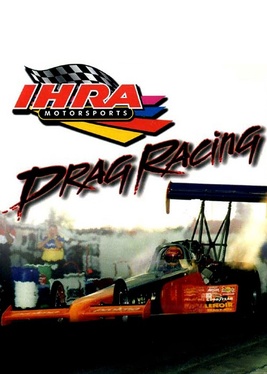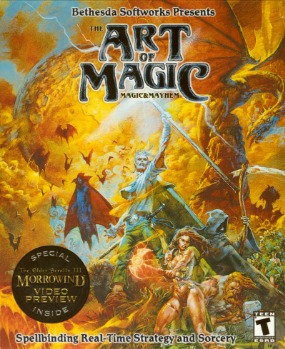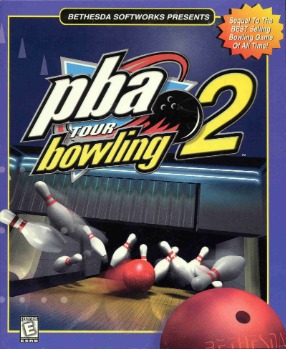
Quake III Arena is a 1999 multiplayer-focused first-person shooter developed by id Software. The third installment of the Quake series, Arena differs from previous games by excluding a story-based single-player mode and focusing primarily on multiplayer gameplay. The single-player mode is played against computer-controlled bots. It features music composed by Sonic Mayhem and Front Line Assembly founder Bill Leeb.

The Dreamcast is the final home video game console manufactured by Sega. It was released on November 27, 1998, in Japan; September 9, 1999, in North America; and October 14, 1999, in Europe. It was the first sixth-generation video game console, preceding Sony's PlayStation 2, Nintendo's GameCube, and Microsoft's Xbox. The Dreamcast's 2001 discontinuation ended Sega's 18 years in the console market.
Bethesda Softworks LLC is an American video game publisher based in Rockville, Maryland. The company was founded by Christopher Weaver in 1986 as a division of Media Technology Limited. In 1999, it became a subsidiary of ZeniMax Media. In its first 15 years, it was a video game developer and self-published its titles. In 2001, Bethesda spun off its in-house development team into Bethesda Game Studios, leaving Bethesda Softworks to focus on publishing operations.

Phantasy Star Online is an online role-playing game (RPG) developed by Sonic Team and published by Sega in 2000 for the Dreamcast. It was the first successful online RPG for game consoles; players adventure with up to three others over the internet to complete quests, collect items and fight enemies in real-time action RPG combat. The story is unrelated to previous games in the Phantasy Star series.

ChuChu Rocket! is an action puzzle game developed by Sonic Team and published by Sega. Released for the Dreamcast in 1999, it was the first game for the system to support online console gaming. Players must place arrows on a board to lead mice into escape rockets while avoiding cats. The game features single-player modes in which a player must save all the mice on a board, and a multiplayer mode in which players battle to collect the most mice.

Unreal Tournament is a first-person arena shooter video game developed by Epic Games and Digital Extremes. The second installment in the Unreal series, it was first published by GT Interactive in 1999 for Windows, and later released on the PlayStation 2 and Dreamcast by Infogrames in 2000 and 2001, respectively. Players compete in a series of matches of various types, with the general aim of out-killing opponents. The PC and Dreamcast versions support multiplayer online or over a local area network. Free expansion packs were released, some of which were bundled with a 2000 re-release: Unreal Tournament: Game of the Year Edition.

An Elder Scrolls Legend: Battlespire is an action role-playing video game developed and published by Bethesda Softworks, set in the world of The Elder Scrolls.

The Elder Scrolls III: Morrowind is a 2002 action role-playing game developed by Bethesda Game Studios and published by Bethesda Softworks. It is the third installment in The Elder Scrolls series, following 1996's The Elder Scrolls II: Daggerfall, and was released for Microsoft Windows and Xbox. The main story takes place on Vvardenfell, an island in the Dunmer province of Morrowind, part of the continent of Tamriel. The central quests concern the demigod Dagoth Ur, housed within the volcanic Red Mountain, who seeks to gain power and break Morrowind free from Imperial reign.

Sonic Shuffle is a Sonic the Hedgehog-themed party game developed and published by Sega for the Dreamcast in 2000. The game plays like a board game much in the same vein as Nintendo's Mario Party series, with up to four players moving their characters across a game board filled with a variety of spaces which can trigger different events. Some spaces will launch minigames that pit the players against each other in short competitive events.

Crazy Taxi is a series of racing games developed by Hitmaker and published by Sega. It was first available as an arcade video game in 1999, then released for the Dreamcast console in 2000. It is the third best-selling Dreamcast game in the United States, selling over a million copies. The game was later ported to the PlayStation 2, GameCube, and IBM PC compatibles with sequels also appearing on the Xbox, Game Boy Advance, and PlayStation Portable systems.

4x4 Evo is a video game developed by Terminal Reality for the Windows, Macintosh, Sega Dreamcast, and PlayStation 2 platforms. It is one of the first console games to have cross-platform online play where Dreamcast, Macintosh, and Windows versions of the game appear online at the same time. The game can use maps created by users to download onto a hard drive as well as a Dreamcast VMU. All versions of the game are similar in quality and gameplay although the online systems feature a mode to customize the players' own truck and use it online. The game is still online-capable on all systems except for PlayStation 2. This was Terminal Reality's only video game to be released for the Dreamcast.

The Dreamcast is a home video game console by Sega, the first one introduced in the sixth generation of video game consoles. With the release of the Dreamcast in 1998 amid the dot-com bubble and mounting losses from the development and introduction of its new home console, Sega made a major gamble in attempting to take advantage of the growing public interest in the Internet by including online capabilities in the console as a selling point. As such, the Dreamcast was the first console to include a built-in modem for Internet support and online play. Sega would end up leaning heavily into the online capabilities to sell the Dreamcast as hype grew for Sony's then-upcoming competitor, the PlayStation 2, which also promised online gaming in addition to its DVD capabilities.

Skynet is a computer game based on the Terminator media franchise. It was intended as an expansion pack for the predecessor The Terminator: Future Shock, but was adapted into a standalone product.

IHRA Drag Racing is a racing video game developed by Digital Dialect and published by Bethesda Softworks. It is part of the IHRA Drag Racing series of video games. A Dreamcast version, which was scheduled to release on April 25, 2001, was canceled. The game was released on mobile phones on June 1, 2003.

PBA Bowling is a 1995 bowling sports-based video game from Bethesda Softworks. A sequel, PBA Tour Bowling 2, was released in 2000.
Skip Barber Racing is a cancelled video game to be published and developed by Bethesda Softworks. The game was in development in conjunction with the Skip Barber Racing School.

Magic & Mayhem: The Art of Magic is a 2001 video game developed by Charybdis Limited and Climax Studios. It is a sequel to 1998's Magic and Mayhem.

PBA Tour Bowling 2 (also known as PBA Bowling 2) is a bowling video game from Bethesda Softworks. The game is a sequel to PBA Bowling.
















